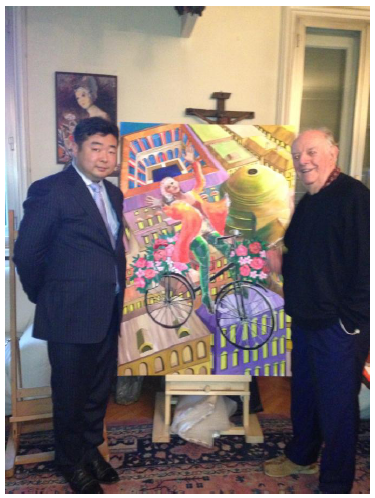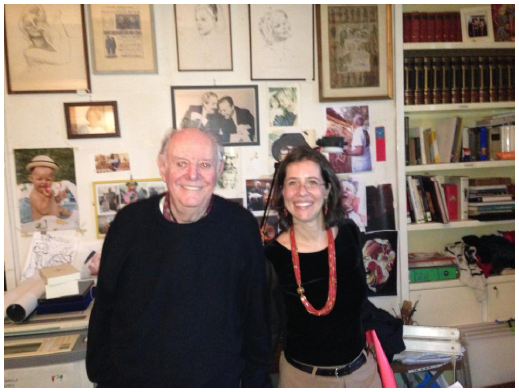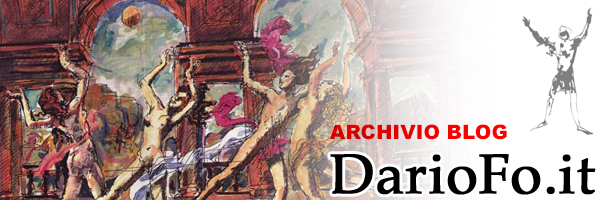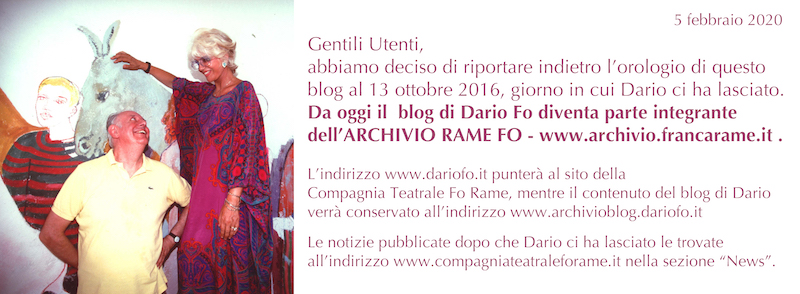(Editor’s note) In 1997, Dario Fo, Italian maestro of theater and painting "who emulates the jesters of the Middle Ages in scourging authority and upholding the dignity of the downtrodden," won the Nobel Prize for Literature. In addition to producing prodigious quantities of provocative creative work, Dario and his late wife Franca Rame played key roles in Italy’s political life. In 2006, Franca was elected senator. Dario has run for Mayor of Milan and remained active with regard to a variety of political, social and cultural issues.
On October 5, 2013, Chang Wang (Thomson Reuters) and Professor Iole Fargnoli (University of Milan) interviewed Dario Fo in Fo’s Milan residence. This interview was conducted in Italian and English. Dr. Linda De Maddalena (University of Milan) transcribed the interview in Italian, and translated it into English. Al Maleson edited the English version.
Chang Wang and Iole Fargnoli:
Dear Maestro, it is a great honor to see you again. As you may remember, it was exactly one year ago, on October 6th 2012, that Chang met you, by amazing coincidence, on a train from Milano Centrale to Firenze.
Dario Fo:
Thank you, and good to see you again, Chang. Sorry for keeping you waiting. I was on the phone with a journalist: very sad news, filmmaker Carlo Lizzani committed suicide today.
Chang Wang and Iole Fargnoli:
We are so sorry to hear that.
Chang also wanted to tell you that all of us in China and in the U.S. were deeply saddened by the sudden passing of your wife Franca. We know how little the words can do to ease the grief that this has caused you. Her passing leaves a void which will not be filled. We gained so much from her charisma, talent, and wisdom. We wish to express our deep sorrow and offer profound condolences to you, and to all who were close and dear to her.
At the same time, we are all thrilled to see the publication of Franca’s memoir In fuga dal Senato (Run from the Senate). We hope to see English and Chinese translations in the near future. We could not agree more with her observation that “we are living in a society whose basic aim is to misinform.”
Dario Fo:
Franca was an unconventional senator – probably just as Lucrezia Borgia was an unconventional daughter of the Pope. The title of her book is “Run from the Senate.” For its cover, I painted a picture of Franca running away from the Senate on bicycle.
Chang Wang and Iole Fargnoli:
It is a great painting, thank you for showing it to us. At this point, we have a list of questions to ask you:
1. Illegal Immigration:
At least 130 African migrants died, and many more are still missing, after a boat carrying them to Europe sank off the southern Italian island of Lampedusa on October 3rd.
It is heartbreaking to hear that many of the dead children were wearing new shoes, a sign of hope for new lives they will never have.
Do you think Italy is now facing an illegal-immigration problem, like the US?
Dario Fo:
Italians have always been a people who emigrated; after World War I, for example, more than one million Italians emigrated to the United States. Now we are becoming a people who receive migrants. And we need them! Our population is going down: the number of inhabitants, and the number of children, is falling in Italy. Illegal immigration helps us fill the gaps in our population. We are saved by illegal immigration. It’s absurd, but it is so.
Chang Wang and Iole Fargnoli:
2. Pope Francis, religion, faith:
We now have a new Pope, who appears to be quite different from the last one. According to President Obama, Pope Francis knows “how to embrace people as opposed to push them away. How to find what’s good in them as opposed to condemn them.”
We understand you are not a big fan of organized religion. Nevertheless, we are curious to hear your comments on Pope Francis’ recent remarks on homosexual, abortion, and contraception.
Dario Fo:
First of all, this is an open-minded Pope who doesn’t want to impose, but wants to discuss problems. Above all, he’s in favor of the dignity of poor people. He says that we must stop being afraid to get undressed, to be nude. As his first act in the cathedral of his village, San Francis threw all his clothes on the ground and said: “From this moment I’m a free man, I have nothing anymore.” The Pope said yesterday that we must have the courage to get undressed, to throw our clothes away, along with the idea that richness is something that exalts you, and that one is better and touched by God only because of wealth.
Chang Wang and Iole Fargnoli:
3. Al Franken, Beppe Grillo, Ai Weiwei:
Al Franken is one of the two US Senators from the State of Minnesota, where I live. Like Beppe Grillo, Al is a comedian turned politician.
Many people were doubtful when Franken entered politics. It has turned out, however, that he is doing pretty well as a politician.
Do you think comedians, intellectuals, and artists can be good politicians? Does playing politics require special skills that artists do not have? Should artists get involved in politics directly? Or should they just observe, comment, and criticize?
Dario Fo:
First of all a good comedian has to be a politician. A comedian must know politics and the tragedy of life. The comedian must know what honesty, poverty, desperation, and lack of justice mean. And then choose one side or the other. The one who can choose to stay at this or at the other side of a program is a politician. We live in a society of lies.
Chang Wang and Iole Fargnoli:
In 2011, Chinese artist Ai Weiwei got in trouble for criticizing Chinese authority. He spent 81 days in solitary confinement. The experience is now visualized by his installation work titled “S.A.C.R.E.D.” on view at the Chiesa di Sant’ Antonio in Venice. Did you see the installation?
Dario Fo:
No, I haven’t seen the installation.
Every time you say something new, you risk being arrested. The power wants the convention –the rules and regulations. Look at those who have done something new, for example Saint Francis. Saint Francis was put in prison and banished by his brothers from the convent. All that we know about him today isn’t true because it is a story created 40 years after his death. It was as the church wanted the story to be told, but isn’t the real story of Saint Francis. 40 years after Saint Francis’s death, the church ordered the burning of every book that had been written during his life.
At present, it wouldn’t be possible to put on an opera that, although it tells the truth about the past, satirizes the authority. I put the past (the 14th century) on stage in “Mistero Buffo” and was imprisoned for it. Because, if you tell the history of the past, you offer a photo of the present. Injustice, lack of correctness, theft, fraud, corruption and violence are always the same.
The Story of Ah Q, by Chinese author Lu Xun, is the story of a poor man who doesn’t have culture and is mistaken for a leader of the revolutionary party. Having taken him in prison and having condemned him to death publicly works in favor of the power. But inside the prison, Q becomes an hero, and the prisoners ask him about Utopian Communism.” And Q invents it. He invents rules and ways of life, taking them from popular traditions. He describes an ideal communism, not the real communism of the bureaucrats. This imagined story of Communism charms everyone who listens to it; as did the unreal description of communism that Che Guevara offered. Had he been in the Russia, he would have been imprisoned.
Chang Wang and Iole Fargnoli:
4. Italian Politics:
Very surprisingly, Silvio Berlusconi and his People of Freedom Party supported Mr. Letta in the recent vote of confidence. Some observers say that Berlusconi is no longer able to control Italian politics, or even his own party. And he is now expected to lose his seat in the Senate. Do you think Berlusconi will continue to play an important role in Italian politics?
Dario Fo:
Italy’s problem isn’t Berlusconi, but the social democratic parties, which have accepted the ideals of “berlusconismo”, before Berlusconi entered politics. For 20 years, the Partito Democratico has been dancing with Berlusconi. They were a clandestine engaged couple. And now they are married and have settled everything. They sleep in the same bed!
Chang Wang and Iole Fargnoli:
5. US government shutdown:
US government is being partially shut down. Some blame Republicans; some blame Democrats; some blame both. President Obama has said that the shutdown is entirely unnecessary, and that he is 'exasperated' by the budget impasse in Congress. On the other hand, Republicans say the President refused to listen to “American people” and negotiate.
Do you have any comments and advice to the American politicians?
Dario Fo:
No, because I know little about the situation. It’s a completely American conflict. However, I think the fight is a pretext: the real fight is a fight for power and for the ability to oversee and manipulate the government and the country.
Chang Wang and Iole Fargnoli:
6. Environment:
I understand that you are very concerned about the environment. Air and water pollution in China are getting very serious. Blue sky is a luxury for the residents of Beijing; respiratory disease is the number one cause of death in China. The pollution index in Beijing is expected to soar above the “hazardous” level of 300 again this week.
In addition, one-half of all groundwater and two-thirds of all surface water in China is polluted.
Low-quality coal and gasoline, as well as the government’s obsession with industrialization and urbanization, are major contributors to all this pollution. But some factions of the Chinese local and central governments benefit directly from the businesses that contribute to pollution, creating conflicts of interest.
Some environmentalists and intellectuals have begun to make connections between the environmental deterioration and China’s political system. This irritates the government, of course, making the environment a very political issue in China.
Do you have any advice to China as to how to protect the environment?
Dario Fo:
It’s the same as in Italy or in America. The basic problem is one of political choice. China has imitated what is done in America or in Italy. China has the possibility to derive energy from the sun and wind. However, it made the wrong choice, with coal and oil, from the beginning. Had it begun producing energy by placing solar panels on the roofs, in the fields, in the forests (it has such big spaces), it could have generated a lot of electric energy and distributed it easily, as they do in Finland, where there’s a charging station for cars every 2 km. Had China developed the culture of electric and Aeolian-energy, it surely would be the healthiest country in the world. On the contrary, China followed the logic of American capitalism, buying oil at the cost of water and selling it at the cost of gold. Unfortunately, this approach doesn’t generate advantages for the population; rather, it generates profits for few individuals.
Chang Wang and Iole Fargnoli:
7. Primer on Your works:
In order to understand your art, which of your works should American and Chinese college students study?
Dario Fo:
Asking an artist to choose one of his works is a little bit daunting: Which helps you better to understand Shakespeare, “Romeo and Juliet” or “Measure for Measure”? I would say, just to start, “Mistero buffo”; and soon after “Morte accidentale di un anarchico”. I’ve written 70 operas, choosing only one is difficult ….
Chang Wang and Iole Fargnoli:
8. Desert Island:
For decades, BBC Radio has aired Desert Island Discs, a show on which guests choose and discuss the eight pieces of music, one book and one luxury item that they would take with them if they were cast away on a desert island.
Do you have a short list of books and music you would like to take with you if you were on a desert island for one year?
Dario Fo:
I really don’t know … there’s an old proverb from Lombardia that is paradoxical and says: “If my grandmother had the wheels, she would be a tram.” What does it mean? It means that a paradox is inescapable, and you can’t make a choice on an absurd paradox. The first thing I would do on a desert island would be to burn the books to make light and heat. The only book I would bring with me to read would be a guidebook for survival on a desert island: because the first rule on a “desert island” is surviving.
Chang Wang and Iole Fargnoli:
9. Reincarnation:
Some people believe in reincarnation: the soul or spirit, after biological death, begins a new life in a new body that may be human, animal or spiritual depending on the moral quality of the previous life's actions. I firmly believe I was an Italian in my immediate past life. Unfortunately, however, I forgot how to speak Italian.
I know you probably do not believe in reincarnation, but could you please just imagine your previous or next life?
Dario Fo:
I’d like it very much if reincarnation existed. I’ve written the introduction for one of Franca’s books, called “Una vita all’improvviso”, where I imagine to have met her 5 times in my passed lives. And I’d like to meet her again in my future lifes.
Chang Wang and Iole Fargnoli:
10. Your next project:
Can you tell us anything about your next project?
Dario Fo:
I have lots of projects. I never start only one. I’ll help some young people who are going to put on a show, then I have to finish 3 books which I’m writing at the same time and after that I will go surely to France, my second native land. Furthermore I’ve big and small appointments. In the end, I will wait to rest.
Dario Fo e Chang Wang di fronte al quadro di Dario
dal titolo “Franca in fuga dal Senato”

Dario Fo e Iole Fargnoli


